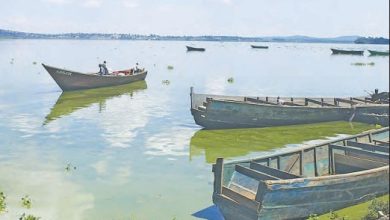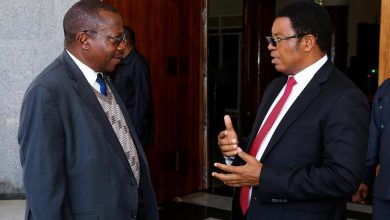From guesswork to GPS, fishing crackdown begins

MWANZA: AQUACULTURES are important sources of animal protein, particularly for most of Tanzania rural communities and the world.
However, increased fishing efforts and excessive use of inappropriate fishing gears and methods, has led to overexploitation of fish stocks in many natural water bodies and resulted in dwindling fish supply.
Moreover, with a declining and stagnating catch from capture fisheries, amplified by expanding population and an increasing proportion of fish being exported as a source of national income has led to overexploitation by harvesting both brooders and juveniles that could replenish the stock for resilience due to illegal fishing.
Due to that challenge, the government has recently introduced solutions in Mwanza City to address issues affecting the fisheries sector, including illegal fishing, which destroys and kills fish breeding grounds.
The launch took place recently in Mwanza city and was officiated by the Deputy Minister for Livestock and Fisheries, Mr Alexander Mnyeti, who explained that the launch of the drone is a long-standing government commitment in its efforts to combat illegal fishing in the country.
“Today is a very historic day in the fisheries sector in our country. This is because the sixth phase government is committed to ensuring illegal fishing in lakes, oceans and rivers is curbed,” he explained.
According to Mr Mnyeti, the launch of the drone, which cost over 250m/- is part of President Samia’s vision to fight illegal fishing in the country and includes doubling the budget for the Ministry of Livestock and Fisheries.
He said President Samia recognises the importance of strengthening the fisheries sector to effectively tackle illegal fishing taking place in rivers, lakes and coastal waters across the country.
ALSO READ: Tanzania beckons AI systems to curb deception during the General Elections
Mr Mnyeti praised Mwanza regional and local government leaders for supporting the national efforts to curb illegal practices in the fisheries sector.
He said the drone’s ability to capture photos of illegal fishing activities will significantly help reduce such incidents on Lake Victoria.
“We are now moving to incorporate this into legal frameworks so that photo evidence captured by this drone can be acceptable in court,” he explained.
He added that President Samia and the Ministry have high hopes that the drone will help reduce the number of illegal fishermen operating in rivers and lakes across the country.
“These are the steps we are continuing to take as a Ministry,” he said, calling on fisheries officers in their respective jurisdictions to strengthen the control of illegal fishing.
The Deputy Permanent Secretary in the Ministry of Livestock and Fisheries, Dr Edwin Mhede, said the drone launch was part of a government promise made through a budget approved by Parliament, which will be implemented through to June 30th in this year.
Dr Mhede said in that budget, the government committed to purchasing an unmanned drone to boost efficiency in managing fisheries resources, where the drone, now acquired, can fly up to 500 kilometres in two and a half hours.
“Our task of controlling illegal fishing in Lake Victoria has been significantly simplified by using this drone,” he explained.
He noted that the launch signifies the use of technology to advance various economic activities in the lake zone and the nation at large.
He said the move aligns with global calls for Tanzania to adopt environmentally friendly technologies that support marine activities.
“This initiative also supports the implementation of Sustainable Development Goal (SDG) No 14, which emphasises life below water,” he explained.
According to Dr Mhede, before this drone’s launch, the government had to rely on patrol boats and dieselpowered vehicles to monitor illegal fishing.
These methods produced a significant amount of carbon emissions, endangering aquatic life.
“With this drone technology, all illegal fishing activities will be detected and photographed wherever they occur,” he said.
He added that land-based patrol officers will now have accurate data to guide them directly to areas of illegal fishing, unlike in the past when operations were based on guesswork.
“This tool also fulfills the President’s directive on adhering to principles of environmental protection and conservation,” he said.
He said the launch of the drone marks the beginning of improvements the government is making in the fisheries sector to ensure it becomes a key contributor to the nation’s economic growth.
He added that under the Ministry’s budget plan, the government intends to purchase seven drones, which will not only be used on Lake Victoria but also in other areas across the country, depending on the needs of the fisheries sector.
He said the seven drones to be acquired by the government will conduct patrols simultaneously on Lakes Tanganyika, Victoria and Nyasa to combat illegal fishing or, if needed, all drones can be deployed to patrol a single lake.
He explained that the drone launched in Mwanza is capable of flying from Mwanza to Kigoma, Kagera and back to the Mwanza region.
He emphasised that these drones, including the one launched in Mwanza recently, will not be operated by just anyone, but only by certified pilots accredited by the Tanzania Civil Aviation Authority (TCAA).
He said the government is confident in the technical expertise of these certified pilots and that their capacity to operate the drones in efforts to control illegal fishing is beyond doubt.
“The government, therefore, does not anticipate any setbacks in drone-led operations against illegal fishing,” he said.
Regarding joint efforts to combat illegal fishing among East African countries, he said that in addition to Tanzania’s efforts on Lake Victoria—shared by Kenya, Uganda and Tanzania, a strong regional body the Lake Victoria Fisheries Organisation (LVFO) has been established.
He said the body is responsible for the regional management of fisheries resources in Lake Victoria on behalf of the East African Community member states.
“Recently, the seventh Council of Ministers meeting was held, preceded by a twoday session of Permanent Secretaries from East African Community member states.
The meetings discussed specific regional strategies on how East African countries can jointly succeed in the fight against illegal fishing in Lake Victoria,” he explained.
Nyamagana District Commissioner Ms Amina Makiragi, who represented the Mwanza Regional Commissioner at the event, commended the government for launching and purchasing the drone to combat illegal fishing in Lake Victoria and other lakes in the country.
She said the Mwanza region is fully prepared to ensure that the fish resources in Lake Victoria are protected and contribute to the income of individuals, communities and the nation as a whole.
The Director of KYM Korea Company Ltd (Autel Korea in Africa Region Mr Othman Hailey who is the producer of the drone, told the Daily News that the launched drone has the transmission range of 18.6 miles and maximum height of 19685 ft (6000m) and maximum payload of 3.31 lbs (1.5kg).
He said the Drone Project KYM Company LTD established in 2018 registered as an Ultra-light aircraft manufacturing Company where in the same year KYM signed business partnership agreements with KYUNGPOOK National University for a smart Drone centre.
“KYM was nationally selected as an Industry academia research joint technology development project and for the industrialisation technology transfer project for the ultra-light aircraft use business,” he said.
Mwanza resident Boniface John said he eagerly wants to see illegal fishing become history after the launch of that drone.
“Illegal fishing in our country is a threat involving various people in our community, I congratulate the government for the launch of the drone, but we are waiting to see action in combating illegal fishing,” he said.





